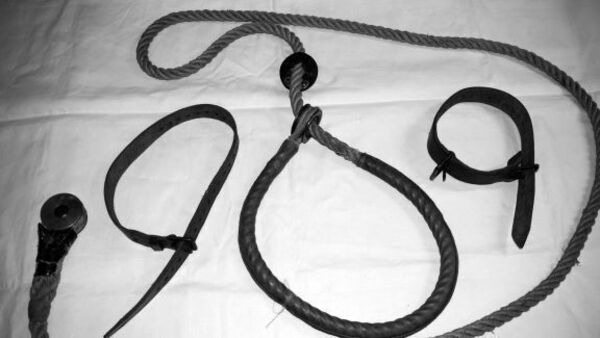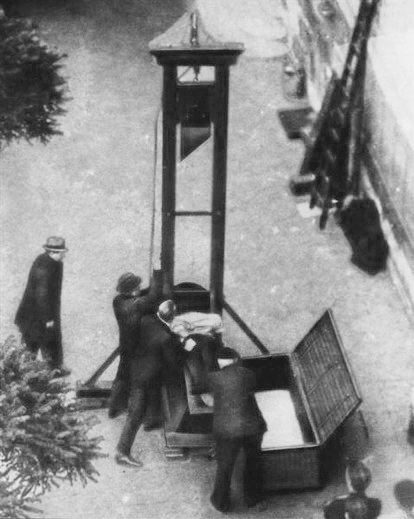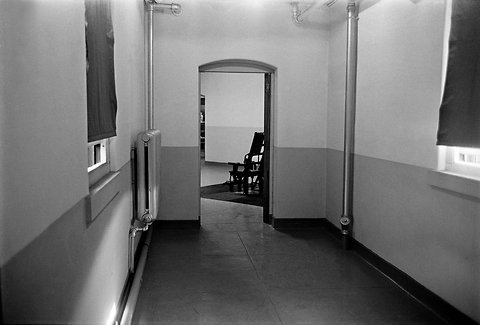Your cart is currently empty!

Murder in Coweta County
Unknown to many, Wallace wa not the only prisoner to die that November day. Jimmie Richardson also had a date with the State Electrician, but even contemorary accounts rarely mention him. The reasons are depressingly simple. Convicted in June, 1950 of murdering his ex-partner, Richardson was African-American, poor and lacked the social status and expensive…
“No one is going to convict me of killing white trash.” – John Wallace, on his victim William Turner.
The case of Georgia murderer John Wallace, Sheriff Lamar Potts and victim William (or Wilson) Turner is now largely forgotten outside Coweta County (where the crime was committed) and Meriwether County, where Wallace, a wealthy landowner, ruled a vast estate known as ‘The Kingdom.’ If reports are to be believed (and there are many of them), Wallace pretty much ran the whole of Meriwether County as well, through his control over County Sheriff Hardy Collier. Wallace was also well known for running his ‘Kingdom’ with an iron fist.
Former sharecropper William Turner felt Wallace’s fist in the worst way. In 1948 Wallace, along with his land holdings and rental incomes, ran a large bootlegging operation making and selling moonshine in the local area. Wallace used his tenants to make, store and deliver the shine for a cut of the profits (and for not being rendered jobless and homeless if they refused). Some of the money went on buying Wallace a good name with regular charitable donations such as new chair and pews for the local church. The rest, which was most of it, Wallace kept for himself.
Unfortunately, bootlegging was lucrative but also illegal. Wallace’s operation had already attracted the attention of revenue agents and Wallace, who knew Collier had no control over Revenue men, feared their wrath. He had nothing to fear from Collier, who owed Walace a small fortune and was content with a cut of the bootlegging profits, but Revenue men were something else. They had also caught Wallace twice before. The most Collier could do was warn Wallace of their presence and activities which included staking out local roads to try and catch the Wallace’s runners. With that in mind, Wallace temporarily shut down the bootlegging and suspended deliveries.
Sharecropper William Turner, however, thought otherwise. Turner had a wife and a sick child and, farming not being the most lucrative occupation, got by as much on delivering shine as he did on working Wallace’s land. He defied Wallace’s order and, in doing so, attracted yet more attention by a run-in with the revenue men on a local road.
Hearing of the incident through Collier, Wallace was livid. Being minor Southern aristocracy, Wallace ruled by decree. Always seeing defiance as a personal slight and threat to his power, he never let either go unpunished. Wallace promptly fired Turner and threw him, his wife and their child off his land. Nursing a grudge, Turner returned late one night having decided to take a couple of Wallace’s prize cows as severance pay. In nearby Carrolton County (where he’d stashed the cows until he could sell them) he was arrested by Chief of Police Threadgill. Thingsalready looked bad for Turner and were about to get infinitely worse.
Granted, the cows were discovered in Carrollton. However, the theft itself was committed in Meriwether and that meant Turner’s transfer to the custody of Meriwether Sheriff Hardy Collier. Collier being Wallace’s property, Turner now faced the tender mercies of an outraged and vindictive Wallace. But not for long.
Held incommunicado and unable to tell anybody he was back in Meriwether, Turner was suddenly released without further explanation. He didn’t need any explanation whatsoever when he walked out of the jail straight into Wallace and several of his henchmen. Running to his truck, Turner charged down the road with two cars bearing Wallace and his heavies in hot pursuit. Taylor didn’t know that they’d already emptied most of his gas tank. Wallace and his bruisers didn’t realise, until it was too late, that they hadn’t siphoned off quite enough. Turner’s truck carried him just over the line into neighbouring Coweta County and out of the jurisdiction of tame Sheriff Hardy Collier.
It later proved disastrous for Wallace’s heavies and fatal for Wallace. Within Collier’s jurisdiction Turner’s death could have easily been dressed up as a failed escape attempt. A furious Wallace, however, had led his thugs into the jurisdiction of Coweta County Sheriff Lamar Potts. At the Sunset Tourist Camp near Moreland they found Turner’s abandoned truck. Having caught Turner, multiple witnesses later testified that Wallace clubbed him with a shotgun until he went limp before bundling him into a car and disappearing back into Meriwether County. Even though the witnesses would also later testify that at one point Wallace hit Turner so hard that his un-cocked shotgun went off, Wallace still thought he was safe once back within his Kingdom.
Wallace was actually anything but safe. Lamar Potts was something of an oddity by the standards of 1940’s Georgia Sheriffs. He was unusually competent, leaving not a single unsolved felony case during his entire 32-year tenure. He was dedicated, once tracking a murderer as far as Kansas before personally bringing him back for trial. He was also even-handed, well known for not showing racial prejudice.
To Potts crooks were crooks and he was a lawman. They existed to be caught and punished regardless of demographic. In a time when many Georgia Sheriffs were also members of the Ku Klux Klan, Potts had no time for race-baiting when reporting a lynching to some Southern lawmen would have meant unwittingly reporting to the lynch mob’s leader. Potts being utterly immune to bribes or threats, Wallace’s money and power in Meriwether would do him no favours in Coweta.
Wallace the tyrant had just met the crusading knight who would destroy his Kingdom.
Potts set to work with a vengeance. Aided by the Georgia Bureau of Investigation (particularly their crime lab) he toured Meriwether County looking for answers. Initially he met with a wall of silence, locals were either too loyal to Wallace (or too afraid of him) to come forward. Eventually, however, an anonymous informant supplied two names; Albert Brooks and Robert Lee Gates.
Potts, well aware of Wallace’s iron-fisted rule over Meriwether and Sheriff Collier, met secretly with them and the case blew wide open. Turner was dead. Wallace had forced them to dump his body in an abandoned well somewhere within the Kingdom. Fearing that Turner’s body might be discovered, he then forced them to remove the body and burn it. Brooks and Gates took Potts and others searchers to the well and the remains of the burn site. In the well they discovered brain matter that the crime lab proved to be human. The burn site and a nearby creek also yielded ash and bone chips. The crime lab proved the bone chips were also human. Both the well and the burn site were located within the Kingdom. By now heavily incriminated, Wallace and several of his henchmen were arrested.
The trial was widely publicised. In October of 1948 Wallace cam before Judge Boykin at the Coweta Superior Court amid a media scrum. The charge was first-degree murder. If convicted, Wallace would likely be condemned and possibly executed. First, though, a wealthy white defendant would have to actually be convicted, in part on the evidence of African-Americans. That had never happened in Georgia before and Wallace was far more confident than a guilty man really should be. As much as anything else, Wallace’s confidence would be his undoing.
Wallace hired eminent and expensive lawyers, unsurprising considering he faced the electric chair. Rattled enough to hire the best lawyers and wealthy enough to afford them, he finally began to realise just how serious a threat Potts really was. The problem with Wallace’s defence, though, was Wallace himself. Long used to simply inventing stories that people fearing him would pretend they believed, Wallace insisted on testifying in his own defence.
In doing so he ruined the efforts of his lawyers. They tried to attack the scientific evidence, claiming that the bone and brain might have been human, but were not specifically those of William Turner. They also tried to fudge the issue and confuse the jury as to whether Turner (if the remains were indeed his) had died in Coweta or Meriwether County. If Turner had died in Meriwether, they argued, then Potts had no jurisdiction to investigate anything. A trial in Coweta County was a trial. A trial in Meriweather would only have been a forgone conclusion.
Brooks and Gates had turned State’s evidence in return for immunity from prosecution and protection from Wallace. They proved very convincing, but it was still considered highly unlikely that a wealthy white defendant would be convicted, never mind executed, on the word of poor African-American farmhands. The witnesses from the Sunset Tourist Camp also proved very damaging to Wallace and, being outside the Kingdom, they had far less to fear from its resident tyrant.
The scientific evidence swayed the jury significantly, as did Wallace’s bone-headed insistence on playing to the jury when he didn’t have to and certainly shouldn’t have. All Wallace accomplished was to make himself look even more guilty to the jury then insult their intelligence with his half-baked story about how Turner was still conscious after arriving in Meriwether and how Wallace had shot him in a tragic accident.
The jury, not surprisingly, believed the scientific evidence, witness evidence and the word of Potts (a hugely-respected lawman). Wallace, a man known to run his domain with an iron fist, who had already served two years for bootlegging and whose violent and vindictive tendencies were well known in the area, buried himself in court. Outside his Kingdom, stripped of his heavies, tame Sheriff Hardy Collier and faced with a talented, incorruptible investigator he couldn’t buy or bully, Wallace’s empire simply fell apart. The jury lost little time rendering their verdict; Guilty as charged.
Wallace was shipped to the Georgia State Prison at Reidsville in Tattnall County. Never before had Georgia’s Death Row welcomed so wealthy a resident. Never before in Georgia history had a white defendant, a wealthy, white defendant at that, been convicted on the evidence of black witnesses. But, Wallace stood convicted of murder and condemned to a seat in ‘Old Sparky’ unless his expensive lawyers could do better on appeal than they had at trial.
They couldn’t. Convicted in 1949, Wallace managed to stay the executioner’s hand until November 3, 1950. At 11am that morning he was escorted, head shaved and bowed in prayer, on his last mile. As he reached the chair Wallace is said to have knelt before it offering a final (if rather equivocal) prayer:
‘Oh God, if there is one, save my soul, if I have one…’
His prayer completed, he sat in the grim white chair, impassive as the straps and electrodes were adjusted. At a silent signal from Warden R. P Balkcom the switch was thrown. Minutes later John Wallace was dead.
After his funeral at Pine Mountain Cemetery, where he was buried some distance from other members of the Wallace clan, his name and legacy lingered on. The book ‘Murder in Coweta County’ revived divisive and, for some, bitter memories of Wallace and his Kingdom. The TV movie of the same name starring Andy Griffith as Wallace and Johnny Cash as Sheriff Potts, also raised the story again.
That said, rural Georgia is a place where memories and tales often far outlast the people involved in them. Even today there is debate and doubt about Wallace’s guilt, about whether gasoline and wood can sustain sufficient heat long enough to entirely consume a human body and whether the human remains were even those of William Turner at all.
Oddly, Meriwether County now has a road leading off Highway 18 named ‘ John Wallace Road’ in his memory. Not to be outdone, Coweta County has a road named after Lamar Potts.Perhaps, in all the stories, legends, memories and myths about Lamar Potts and John Wallace, people might care to remember William Turner. And his widow and orphaned daughter.
Unknown to many, Wallace wa not the only prisoner to die that November day. Jimmie Richardson also had a date with the State Electrician, but even contemorary accounts rarely mention him. The reasons are depressingly simple. Convicted in June, 1950 of murdering his ex-partner, Richardson was African-American, poor and lacked the social status and expensive lawyers hired by Wallace. He also lacked the notoriety.
Crisp County had sent Richardson to Reidsville courtesy of his own crime and Judge Gower of Crisp County Superior Court. Claiming he had been too drunk to remember what had happened, Richardson also claimed his confession had been coerced which was certainly possible in the racial and social cimate of 1940’s Georgia. Lacking Wallace’s money and not being white, Richardson’s wait on Death Row was only a few months. Wallace, on the other hand, had been able to stay the executioner’s hand for over a year.
Not only poor and African-American, Richardson’s case attracted nowhere near the publicity and scrutiny accorded to Wallace. This was by no means unusual at a time when press coverage was dictated by public interest. The executions of already-notorious felons allowed newspapers one last chance to rehash the grisly details of their lives and crimes, one final chance to boost circulation and profits before moving on to the next big story.
Felons like John Wallace boosted profits. Felons like Jimmie Richardson did not. It was quite common for double, triple or even multiple executions to go ahead with notorious prisoners publicised and those dying minutes before or after completely ignored. Wallace’s death made state history. Richardson’s seldom merited a mention.
While Wallace attracted great attention as Georgia’s first wealthy white prisoner executed partly on African-American testimony Richardson (an African-American) walked into the death chamber, sat down and died with even newspaper witnesses neglecting to mention him in their coverage of Wallace’s execution. Richardson and his victim were Georgians too, but their deaths were seen as uninteresting. John Wallace still haunts Georgia even today.
One response to “Murder in Coweta County”
-
Robert -Wow! You hit another one out of the park! Thanks for this fascinating and expertly crafted story. Despite all my years as a true-crime buff, I was surprised (pleasantly!) that I had never heard of this case. Keep up the great work! I always look forward eagerly to your new posts. You have a huge fan in Wisconsin USA!




Leave a Reply